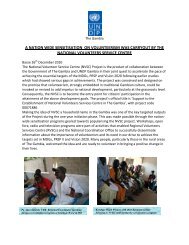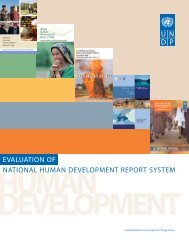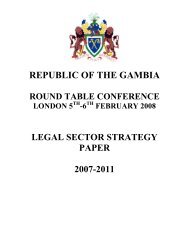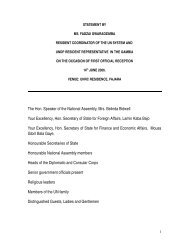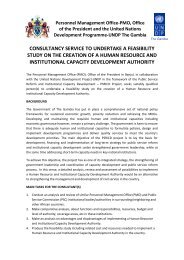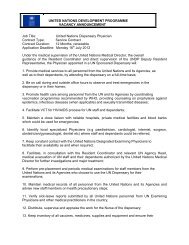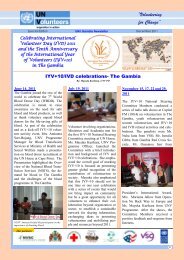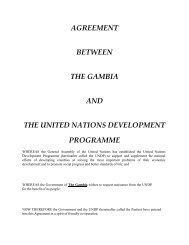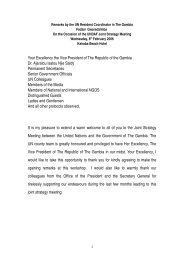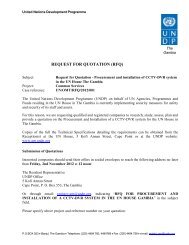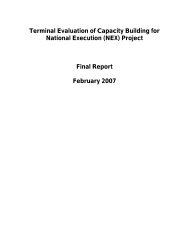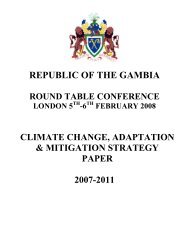Introduction - UNDP The Gambia
Introduction - UNDP The Gambia
Introduction - UNDP The Gambia
You also want an ePaper? Increase the reach of your titles
YUMPU automatically turns print PDFs into web optimized ePapers that Google loves.
________________________________________________________________________________________________________________________<br />
higher echelons was introduced in Ghana and<br />
Uganda, through a “high–flyer<br />
scheme.” Under this scheme, young officers<br />
who are deemed to have the potential are<br />
being given specialised training to enable<br />
them to maximise their potential and<br />
strengthen the capacity of the civil service<br />
through accelerated promotion, if they are<br />
able to demonstrate their worth.<br />
In Ghana, in 2001, 50 officers were attached<br />
to private organisations such as Unilever<br />
Mobil Ghana Limited, Social Security and<br />
National Insurance Trust and Home Finance<br />
Company to expose them to the way jobs are<br />
executed and programmes managed in the<br />
private sector.<br />
the monitoring of training, study leave,<br />
retirement, end of contractual obligations and<br />
enforcement of bonding.<br />
2.6.2 Effective Management of the<br />
Training Function<br />
In spite of the existence of several<br />
instruments and organs, including Personnel<br />
Policy, Training Policy, Training Advisory<br />
Council and Training committees, the training<br />
function in the civil service continues to be<br />
disjointed, ad-hoc, and un-coordinated.<br />
Training is generally not preceded by a<br />
systematic identification of specific and clear<br />
training needs, and the completion of training<br />
is not followed by an evaluation of training<br />
benefits.<br />
<strong>The</strong> adoption of a high-flyer scheme in the<br />
<strong>Gambia</strong>n public service will enhance career<br />
development, performance and productivity.<br />
4 Decentralisation of Promotion Systems<br />
Like many other African civil service<br />
commissions, the Public Service Commission<br />
in <strong>The</strong> <strong>Gambia</strong> lacks the capacity to<br />
substantially improve efficiency and<br />
discipline in the public service through<br />
sanctions and rewards. <strong>The</strong> commission does<br />
not have the managers, equipment and other<br />
resources essential for maintaining records<br />
and for monitoring the activities of personnel,<br />
with the result that:<br />
• promotions and appointments are<br />
delayed due to protracted bureaucratic<br />
processes<br />
• bonding requirements of trainees are not<br />
generally fulfilled and enforced<br />
• performance of technical assistance<br />
personnel is not generally monitored<br />
• counterpart staff are seldom provided on<br />
a sustained basis<br />
• remuneration and staff development<br />
policies are not streamlined and<br />
coordinated, and ad-hoc measures<br />
become the order of the day.<br />
To minimise these problems, several African<br />
countries have delegated recruitment and<br />
promotion to departmental/ministerial/civil<br />
service councils, thereby reducing delays in<br />
promotions and recruitment, and facilitating<br />
<strong>The</strong> result is that training does not guarantee<br />
value for money and very often is perceived<br />
as an opportunity for facilitating the pursuit<br />
of greener pastures. This is why technical<br />
assistants provided to government agencies<br />
do not usually have any regular counterparts.<br />
Also the investment of resources in training<br />
by development partners has not significantly<br />
enhanced capacity in the civil service.<br />
Some of the local training institutions are<br />
under-utilised. <strong>The</strong>re is also a pressing need<br />
for institutional renewal and revamping of<br />
programmes to ensure relevance, costeffectiveness<br />
and sustainability.<br />
Utilisation of Other Trainees Through<br />
Bonding and Schemes: Although a bonding<br />
scheme exists in the civil service<br />
administered by the PMO, effective<br />
enforcement has remained a major<br />
problem. In theory, civil servants whose<br />
training programmes lead to professional or<br />
degree qualifications and funded by<br />
Government are required to sign a bond and<br />
to provide two guarantors who are required to<br />
meet certain eligibility criteria.<br />
Cases of violations of bonds are abundant in<br />
the civil service, and there have been very<br />
few cases when the Attorney General’s<br />
Chambers resorted to legal action to enforce<br />
the requirements of a bond. As a result, many<br />
civil servants who have been trained by<br />
________________________________________________________________________________________________<br />
Building Capacity for the Attainment of the Millennium Development Goals in <strong>The</strong> <strong>Gambia</strong> National Human Development Report 2005<br />
23



